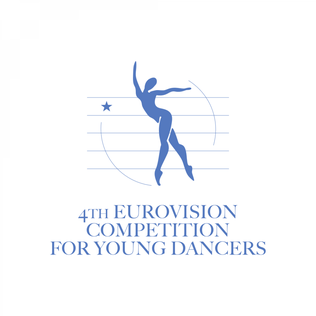
The Eurovision Young Dancers 1989 was the third edition of the Eurovision Young Dancers held at the Palais des Congrès in Paris, France on 28 June 1989. Organised by the European Broadcasting Union (EBU) and host broadcaster France Régions 3 (FR3), dancers from ten countries participated in the televised final. A total of seventeen countries took part in the competition. Cyprus and Portugal made their debut at the contest.

The Eurovision Young Dancers 1991 was the fourth edition of the Eurovision Young Dancers, held at the Helsinki City Theatre in Helsinki, Finland on 5 June 1991. Organised by the European Broadcasting Union (EBU) and host broadcaster Yleisradio (YLE), dancers from eight countries participated in the televised final. A total of fifteen countries took part in the competition. Bulgaria made their début, while Austria, Canada and United Kingdom chose not to send an entry. However, the Austrian broadcaster ÖRF and the Canadian CBC broadcast the event.

The Eurovision Young Dancers 2001 was the eighth edition of the Eurovision Young Dancers, held at the Linbury Studio Theatre of the Royal Opera House in London, United Kingdom between 18 and 23 June 2001. Organised by the European Broadcasting Union (EBU) and host broadcaster British Broadcasting Corporation (BBC), dancers from eleven countries participated in the televised final. A total of eighteen countries took part in the competition. Ireland and Ukraine made their début while Austria, Estonia and Norway returned. Hungary and Spain decided not to participate, along with France who broadcast the event.

Austria has participated in the Eurovision Song Contest 56 times since its debut in 1957. The country has won twice, in 1966 and 2014, and such it holds the record for the longest gap between consecutive wins — 48 years. The Austrian participant broadcaster in the contest is Österreichischer Rundfunk (ORF). Vienna was the host city on both of the occasions that the contest was held in Austria, in 1967 and 2015.

Eurovision Young Musicians, often shortened to EYM, or Young Musicians, is a biennial classical music competition for European musicians that are aged between 12 and 21. It is organised by the European Broadcasting Union (EBU) and broadcast on television throughout Europe, with some countries holding national selections to choose their representatives for the contest.

The Eurovision Dance Contest 2007 was the inaugural edition of the Eurovision Dance Contest, a dance competition co-production between the European Broadcasting Union (EBU) and host broadcaster BBC. The first ever pan-European dance competition was held on 1 September 2007 in London, United Kingdom with the participation of 16 countries.

The Eurovision Young Musicians 2008 was the fourteenth edition of the Eurovision Young Musicians, held at the Rathausplatz in Vienna, Austria on 9 May 2008. Organised by the European Broadcasting Union (EBU) and host broadcaster Österreichischer Rundfunk (ORF), musicians from seven countries participated in the televised final. This was the second time that the competition was held on an open-air stage and was the beginning of the annual Vienna Festival. Austria and broadcaster ORF previously hosted the contest in 1990, 1998 and 2006.

Andreas "Andi" Knoll is an Austrian radio and television presenter. He has served as the Austrian commentator for the Eurovision Song Contest since 1999.

Austria has participated in the biennial classical music competition Eurovision Young Musicians 19 times since its debut in 1982 and is the most successful country in the contest, with a total of six wins. Austria has hosted the contest a record six times, in 1990, 1998, 2006, 2008, 2010, and 2012.

Malta has participated in the Eurovision Young Dancers 2 times since its debut in 2015. On 7 July 2015, PBS Malta, which is responsible for Malta's participation confirmed that Malta will host the 2017 edition. However, in January 2017, the EBU announced that PBS had due to circumstances beyond their control been forced to cancel their staging of the competition. Nevertheless, they will still take part in the contest.

Slovenia has participated in the Eurovision Young Dancers 10 times since its debut in 1993.

The Czech Republic has participated in the Eurovision Young Dancers 7 times since its debut in 1999. The Czech Republic has hosted the contest twice, in 2015 and in 2017.

Belgium has participated in the Eurovision Young Dancers 11 times since its debut in 1985. In 1987, Belgium and the Netherlands participated together with a joint entry.

Yugoslavia has participated in the Eurovision Young Dancers 3 times.

Poland has participated in the Eurovision Young Dancers 11 times since its debut in 1993. Poland has hosted the contest a record three times, in 1997, 2005 and 2013, and has won the contest three times. On 5 September 2016, Polish broadcaster Telewizja Polska (TVP) confirmed they would participate again in 2017.

The United Kingdom has participated in the Eurovision Young Dancers 7 times since its debut in 1985, most recently taking part in 2005. The UK has hosted the contest once, in 2001 and jointly won the contest in 1989.

Portugal has participated in the Eurovision Young Dancers 4 times since its debut in 1989.

Switzerland has participated in the Eurovision Young Dancers 9 times since its debut in 1985. Switzerland has hosted the contest once, in 1995.

Estonia has participated in the Eurovision Young Dancers 4 times since its debut in 1993.

The Eurovision Young Dancers 2017 was the fifteenth and final edition of the Eurovision Young Dancers competition. The final took place at the Prague Congress Centre in the Czech capital, Prague on 16 December 2017. This was the second consecutive time that the Czech national broadcaster, Česká televize (ČT), organised the contest. The event is aimed at young dancers aged between 16 and 21, competing in modern dances, be it solo or in couples, as long as they were not professionally engaged.



















